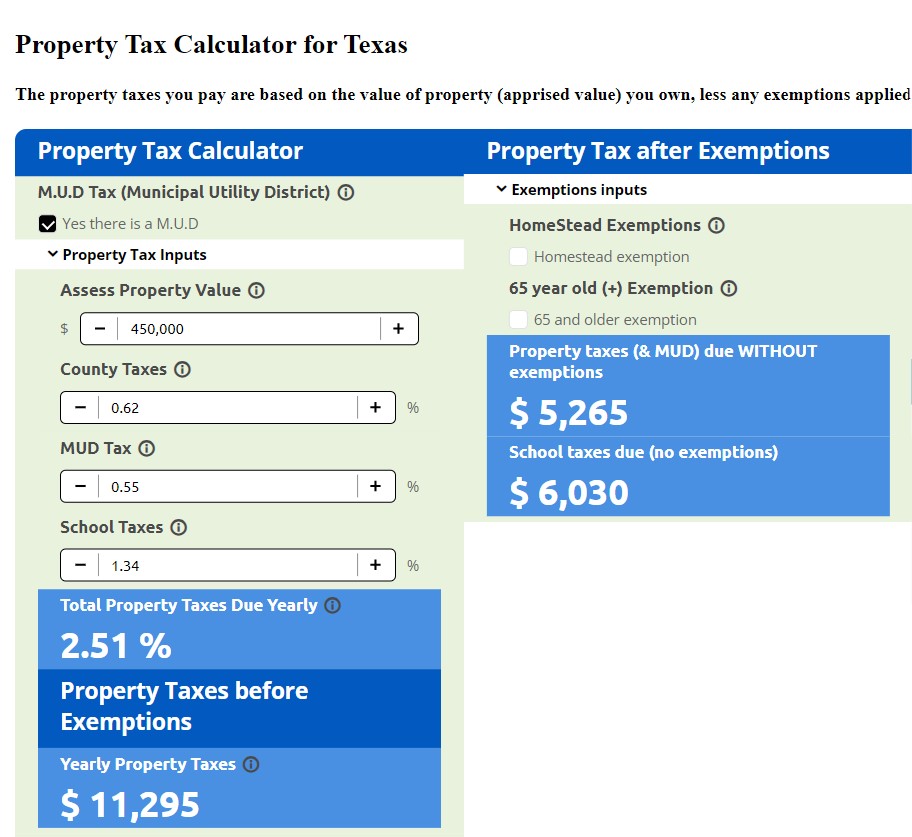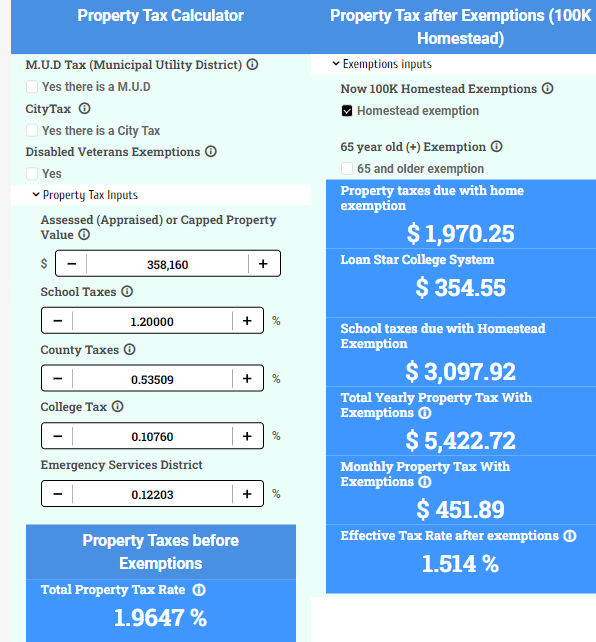Property Tax Calculator for Texas

How To Calculate Property Taxes in Texas
An easy way to estimate your property taxes using the convenient Property Tax Calculator for Texas. This user-friendly tool allows you to quickly and accurately calculate your property taxes based on the current tax rate in your area.
Simply enter your property value and your tax rate and any exemptions you might have to calculate a Tax estimate. Check it out here: https://thegiffordgroup.net/home-buyers-guide
We have updated the Calculator so that it include Disabled Veterans Exemptions now!
Property Tax Calculator for Texas
Here are some essential things that you should know about property taxes in Texas around the Houston area:
Property Taxes Are Calculated Based
On the Property’s Value In Texas, where the Houston area is located, property taxes are calculated based on the value of the property.
Check out LOCAL PROPERTY APPRAISAL AND TAX INFORMATION
Your property’s value is assessed
by the Harris County Appraisal District (HCAD) or your county's tax office (see more below), which calculates the value based on the market value of the property, its location, and amenities.
Market Value vs Appraised Value?

See other Appraisal Districts below.
Property Taxes Are Used for Local Services
The property taxes paid by Houston homeowners are used to fund local services such as school districts, hospitals, law enforcement, and public transportation. The taxes collected are distributed to the different neighborhoods where the property is located.
It is important to note that this Exemption Total Value is made up of (Homestead Cap loss & the 20% homestead Exemption on Appraised value).

HOMESTEAD CAP EXPLAINED
The Texas Property Tax Code Section 23.23 establishes a restriction on the annual increase of the total assessed value for properties under the homestead exemption.
Under this provision, any increase in the assessed value is limited to 10% from year to year, excluding any improvements made by the property owner.
It is important to note that this limitation applies solely to the assessed value and does not impose any restrictions on changes in the market value of the property.

Market value refers to the price at which a property would sell and can vary each year based on sales data.
(Not used for tax purposes thankfully!)
The assessed value, on the other hand, is utilized to calculate property taxes. As a result, it is possible to observe two distinct values for the same property: the market value and the assessed value. The discrepancy between these values is referred to as the Homestead cap loss.
In this Example this year (for 2023) appraised value is $487,267. There is a $92,052 cap loss from previous years, as the home's Appraised value can NOT go up more than 10% each year you lived in the home. For residence homesteads, the annual increase is limited to 10% more than the previous year’s appraised value plus, new improvements.

The previous year's Appraised value (2022) was $442,970. So $442,970 * 1.10% = $487,267 new (max Appraised value, even though they think the Market value is
So the new Appraised value in 2023 will be $487,267.

Different Tax Rates VS Different Taxable Values
They all have Different Tax Rates, and Each has Different Taxable Values!
Look at the 4 Different Taxes you pay in Fort Bend County for this house.
Taxing Authority Tax Rate Taxable Value
Fort Bend Drainage 0.0129 $389,814 = $5,028.60 (20% Homestead Exemption on this)
Fort Bend General 0.4383 $389,814 = $1,708.55 ( 20% Homestead Exemption on this)
Fort Bend MUD 151 0.850 $487,267 = $4,141.77 (No Homestead Exemption on this MUD Taxes, some counties do offer exemptions)
Lamar CISD 1.242 $447,267 = $5555.06 ($40,000 homestead Exemption on school taxes)

https://thegiffordgroup.net/home-buyers-guide (has the property Tax Calculator)
M.U.D Taxes
In addition to MUD taxes, counties, school districts, colleges, and other local property taxes are listed. In contrast, MUD taxes pay for the initial utility services installed in the neighborhood, while other taxes go to their respective taxing entities, so MUD taxes are temporary.
MUD taxes are used to pay off bonds or loans, so as more payments are made, the tax rate becomes lower. More residents moving into a MUD also lowers the rate per resident over time.
All the different Mud Bond in Houston Area

Read about Homestead Exemption and Other Property Tax Savings
Know what Exemptions Are Available
There are exemptions available for some homeowners that reduce their overall property tax burden. For example, the homestead exemption is available for primary residences, and it exempts a portion of the home’s assessed value from taxation. Other exemptions are available for senior citizens, disabled persons, and veterans.
Read more https://thegiffordgroup.net/f/how-to-calculate-property-tax-in-texas
There are several types of exemptions you may receive.
How do I apply for a homestead exemption?
You must apply with your county appraisal district to apply for a homestead exemption. Applying is free and only needs to be filed once. The application can be found on your appraisal district website or using Texas Comptroller Form 50-114.
Property Tax Deferrals in Texas
In Texas, property tax deferrals offer homeowners the option to delay the payment of their property taxes under certain circumstances. These deferrals are designed to assist individuals who may be facing financial hardships, To qualify for this deferral, you must be a senior, a person with a disability, or the surviving child or spouse of a senior or person with a disability.
By deferring property tax payments, eligible homeowners can alleviate immediate financial burdens and gain more time to manage their tax obligations. It's important to note that property tax deferrals are not forgiveness programs but rather temporary postponements.
Homeowners should consider utilizing property tax deferrals when they are facing financial constraints and are unable to make timely payments. However, it's crucial to carefully review the eligibility requirements, as well as any interest or penalties that may accrue during the deferral period, to make an informed decision about utilizing this option.
There is a 5% annual interest fee on deferred taxes, compared to 24% on unpaid taxes that are not deferred. This interest is deferred until the home is sold or the owner dies. Read more here Tax code chapter 33
- To avoid foreclosure and unexpected payments, it is important that you talk to an attorney or a tax professional before applying for a deferral.
- Asking for a deferral: Use Form 50-126 or check with your appraisal district to see if they have a different form they want you to use. File the form with your appraisal district or assessor’s office.
Check out the Property Tax calculator here for yourself.



